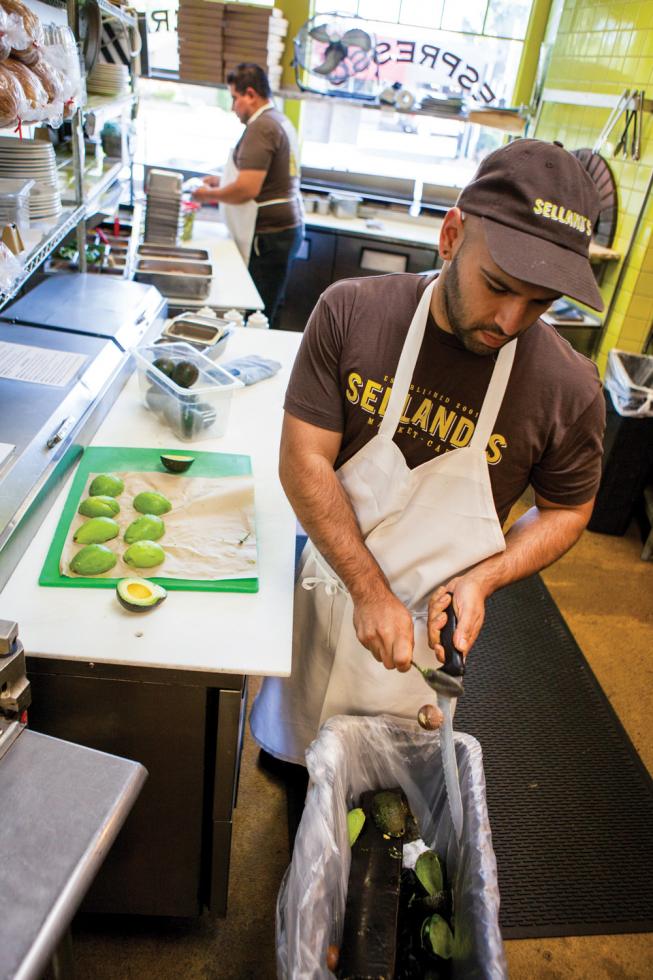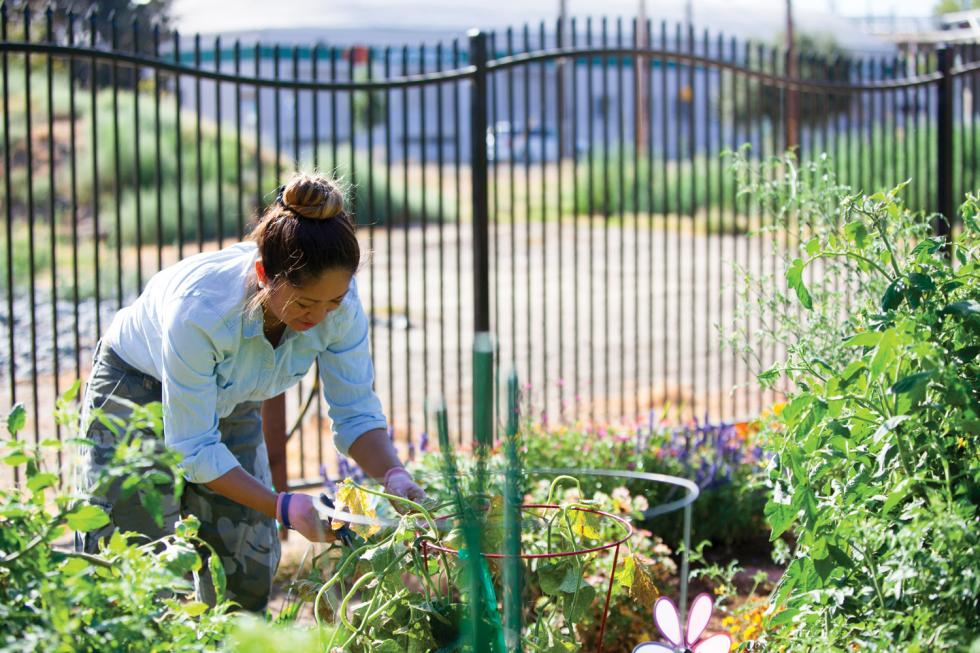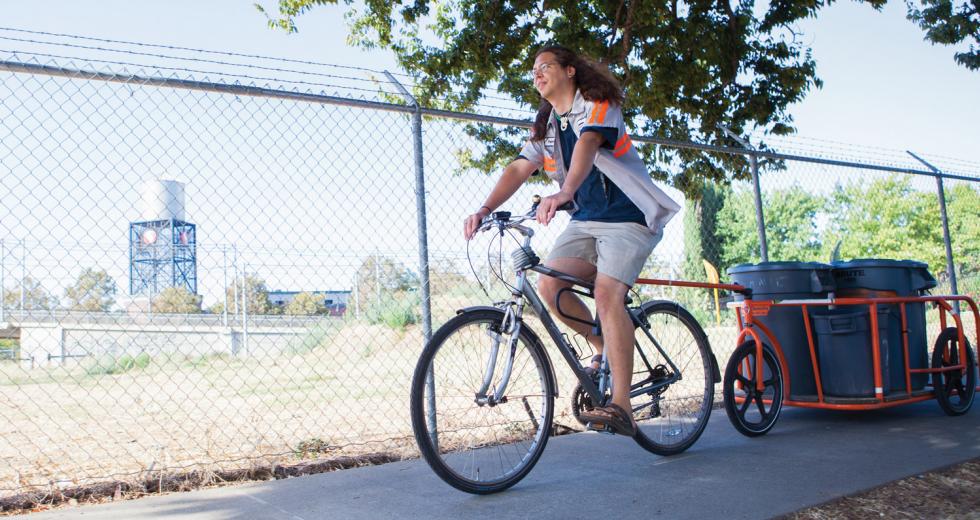It’s Saturday morning in Midtown Sacramento and the August sun is already blazing overhead. The heat is hardly a deterrent for David Baker as he makes his weekly rounds, his bicycle fastened to an orange cargo trailer loaded with clean organic waste bins ready to be exchanged for their filled counterparts sequestered in restaurants all over the grid.
Among Baker’s first stops is The Waterboy, where he finds one bin topped with leafy greens and another jammed with hollowed orange halves. Next up is Sun & Soil Juice Company where two bins brimming with dried up beets and carrots weigh in at over 300 pounds.
Baker carefully bikes his load to the community garden at 19th and Q streets, where it will be dumped into composting bins, turned by volunteers and eventually donated to local gardeners tending their tomatoes and competing for the tallest sunflower onsite.
“We want the restaurant industry to understand that these are valuable scraps that are delivered to people — people that are smiling and happy to get this stuff.”,David Baker, director, Green Restaurants Alliance Sacramento
This is ReSoil Sacramento in action, a program operated by Green Restaurants Alliance Sacramento, of which Baker is the director. This morning’s route is a miniscule sampling of who and where ReSoil serves. Since officially launching in 2014, ReSoil has diverted 405,000 pounds of pre-consumer waste (think eggshells and banana peels plus compostable recyclables like cardboard) from 16 Midtown and East Sacramento restaurants to 30 different community gardens and urban farms. GRAS provides the service to restaurants for a monthly fee, or trade if necessary.
“[At a restaurant], everything that goes out onto the customer’s plate is exactly as it should be: every drop of olive oil, every garnish,” Baker says. What if we dealt with the end products in the same way? “We want them to have that meticulous care for the waste that they’re producing.”
Though largely hidden from the consumer’s eye, food waste is hardly insignificant. According to the U.S. Department of Agriculture, we waste between 30 to 40 percent of food each year — and with it water, money and the chance to feed food-insecure people. Last year, the USDA and Environmental Protection Agency established a goal to cut nationwide food waste in half by 2030.
ReSoil is only one way local restaurants have chosen to reduce their food waste. While ReSoil collects pre-consumer waste, most post-consumer waste — that last bite of hamburger you couldn’t quite finish — is collected by Atlas Disposal and sent to CleanWorld anaerobic digesters, which break down scraps into natural gas that then fuels Atlas trucks.
Closing the Farm-to-Fork Loop
East Sacramento restaurant Selland’s Market-Cafe is a leader in sustainable waste management in the area, according to Baker. Josh Nelson, cofounder and chief financial officer of Selland Family Restaurants, however, is somewhat hesitant to embrace the accolades.
Selland’s Market-Cafe has its food waste collected by ReSoil
Sacramento.

“Doing the right thing is always important to us,” Nelson says. “We don’t have a goal of being zero waste, we just want to put the best program we can into place. If it’s zero waste, that’s fantastic. It’s great to be acknowledged but we don’t seek anything. We’ve never applied for an award. We don’t promote it or use it as a marketing tool.”
That’s a humble statement, coming from a representative of the restaurant that in 2015 won Breathe California’s Clean Air Award and is among few in the area approaching the zero waste designation (officially determined by the Zero Waste International Alliance when at least 90 percent of an establishment’s waste is diverted from landfills). Selland’s diversion systems include: pre-consumer waste pickup by ReSoil; sending stacks of cardboard to McClaskey Adult Center on J Street for use in composting; training bussers to separate post-consumer waste to be sent to the digester; and even gathering wine corks for local art organizations such as ReCreate, which uses scraps from local businesses for projects. This leaves less than a four-yard dumpster of trash per week.
According to Baker, Selland’s has diverted 37,732 pounds of pre-consumer waste to ReSoil in the past two years, all of which goes to area gardens, farms and individuals. “We want the restaurant industry to understand that these are valuable scraps that are delivered to people — people that are smiling and happy to get this stuff,” Baker says. “We’re trying to localize all the waste [and] close the loop in the food cycle so that any extra food goes back into the soil to create more healthy food.”
Related: Soil matters
There are hurdles to jump in dealing with waste efficiently and sustainably. “It’s just one more thing to manage,” Nelson says, noting it’s additional work at an additional cost. Employees also must be properly trained, which can be complicated by turnover. “I don’t think my neighbor’s bad because they don’t separate their carrot scraps. It would be great if they did, but I understand everyone’s challenges. Either they can’t afford the extra $150 a month for the dumpster or they don’t have the space for it.”
Thinking Outside the Compost Box
Janel Quayle works on her harvest at the community garden at 19th
and Q streets in Sacramento.

Another Sacramento farm-to-fork mainstay, Mulvaney’s Building and Loan, is diversifying its approach by setting its sights on the field. In addition to sending out scraps to the digester (the restaurant annually diverts enough waste to fill its 50-seat dining room), owner Patrick Mulvaney champions “ugly fruit.” This sunburnt, overripe or too small produce isn’t making it to market. His proposition: To buy the edible undesirables at a discount, allowing farmers to sell the more perfect produce at higher rates, while he uses the food that would otherwise get tossed. “My hope in all this is that what we’re doing is helping them to make more money,” he says.
Mulvaney also focuses on donating surplus food that isn’t going to get eaten. When a recent event hosted at the B&L left the restaurant with enough untouched food for about 100 meals, Mulvaney proposed a donation to Loaves & Fishes, but not without some concern. The barrier is inherent skepticism about prepared, donated food. But he detailed the preparation, handling and storage of the food and was able to donate what would have otherwise been tossed.
Mulvaney describes his ideals as “hippy dippy,” but stresses small efforts. “We’re just a small restaurant in a smallish city. But what happens if that expands? What if everyone started using anaerobic digestion? Is there a way to get that food out of the field and into [food-insecure] bellies? What does that look like?”
One change that could help divert food waste on a large scale is if the City of Sacramento implemented a municipal composting program — like those in San Francisco, Emeryville and Davis. Andrea Lepore, owner of Hot Italian, which pioneered an on-site composter when it opened in 2009, is a proponent. “[A municipal program] would be ideal,” Lepore says. “Restaurants are dealing with many details on a daily basis. If that was streamlined, it would be easiest for everyone.”
For Baker, the grassroots still rule. “Restaurants and the farmers are partners in completing the food-cycle [and] keeping the nutrients in the neighborhoods to build healthy soil,” he says. “We have the capacity to turn a vacant lot into a healthy garden bearing nutritious food.”




Comments
Has anyone started a business that can streamline restaurant's transition to sorting waste and connecting with com posters and digesters? It seems like an opportunity.